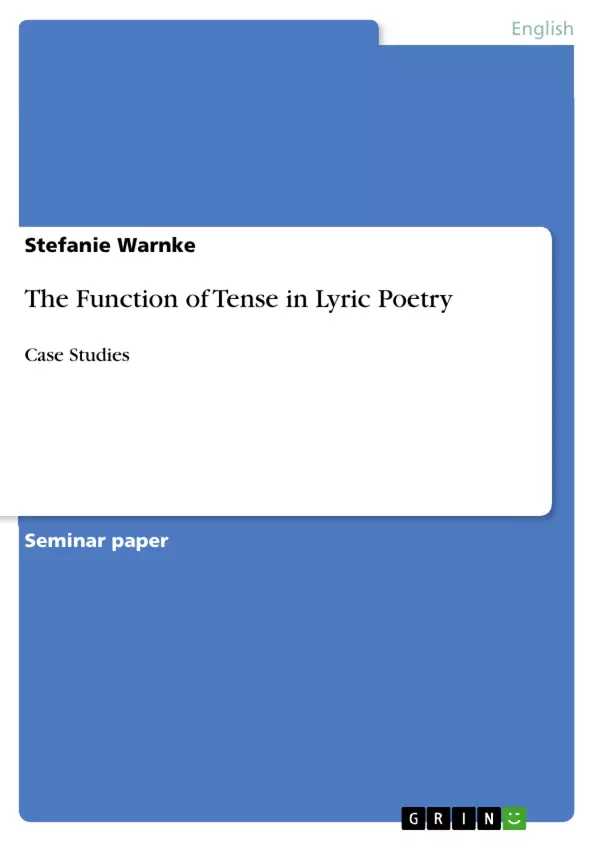This term paper is concerned with the topic ‘Tense in lyric Poetry’. Initially, I would like to discuss the function and the occurrence of tense in lyric poetry as well as the way the reader experiences tense in poems. Therefore, I have chosen two well-known poems by William Blake and William Wordsworth. These poems will be studied not only with regard to tense, but also with respect to the meaning.
To achieve this goal, I will, first of all, give a theoretical contribution about the theme ‘Tense in lyric Poetry’ which includes small illustrations of English and German poetry. Secondly, I will discuss the theoretical statements with the help of the two poems selected.
Table of Contents
- Introduction
- Theory: Tense in lyric poetry
- Present tense
- Past tense
- Future tense
- Case studies
- William Blake: 'London'
- William Wordsworth: 'I wandered lonely as a cloud'
- An experiment: the switch of tenses
- 'London' in past tense
- 'I wandered lonely as a cloud' in present tense
- Summary/Conclusion
- Literature
Objectives and Key Themes
This term paper examines the function of tense in lyric poetry. The main objective is to explore the relationship between tense and the reader's perception of a poem, specifically focusing on how different tenses contribute to the overall meaning and effect. This is achieved by analyzing the use of tense in two well-known poems by William Blake and William Wordsworth, and by experimenting with tense shifts in those poems.
- The function of tense in lyric poetry
- The relationship between tense and the reader's experience
- The use of present and past tense in lyric poetry
- The impact of tense on the expression of subjectivity
- The effect of tense shifts on the meaning and impact of poems.
Chapter Summaries
Introduction: This chapter introduces the concept of tense and its importance in both everyday communication and lyric poetry. It defines tense grammatically and highlights its influence on how a reader perceives a poem. The chapter establishes the paper's focus on analyzing the function of tense in lyric poetry using case studies of poems by William Blake and William Wordsworth. It outlines the paper's methodology, which involves a theoretical discussion of tense in lyric poetry followed by an analysis of the selected poems.
Theory: Tense in lyric poetry: This chapter delves into the theoretical understanding of tense in lyric poetry. It challenges the traditional notion of the present tense as solely appropriate for lyric poetry and the past tense for epic poetry. The chapter emphasizes the importance of examining the relationship between past and present tenses within a poem and how this relationship contributes to its overall meaning. It uses examples from English and German poetry to illustrate how different tenses can affect the expression of subjective experience and the poem's immediacy.
Case studies: This chapter presents in-depth analyses of William Blake's "London" and William Wordsworth's "I wandered lonely as a cloud," focusing on their use of tense. It explores how the choice of tense in each poem contributes to its meaning, mood, and the reader’s experience. The analysis considers the relationship between tense and the expression of subjectivity and the poem's overall impact. It lays the groundwork for the following experiment of tense alteration.
Keywords
Lyric poetry, tense, present tense, past tense, William Blake, William Wordsworth, subjectivity, immediacy, temporal relations, literary theory, poetic language, 'I'-expression.
Frequently Asked Questions: A Comprehensive Language Preview
What is the main topic of this term paper?
This term paper examines the function of tense (present, past, future) in lyric poetry and how different tenses affect a reader's understanding and experience of a poem.
Which poems are analyzed in this paper?
The paper focuses on two well-known poems: William Blake's "London" and William Wordsworth's "I wandered lonely as a cloud."
What is the methodology used in this paper?
The paper employs a mixed-methods approach. It begins with a theoretical discussion of tense in lyric poetry, followed by in-depth analyses of the chosen poems. Furthermore, it includes an experiment where the tenses in the poems are altered to observe the impact on meaning and effect.
What are the key objectives of this paper?
The main objective is to explore the relationship between tense and the reader's perception of a poem. The paper also aims to analyze how different tenses contribute to the overall meaning and effect of a poem, examining the use of present and past tenses, and the impact of tense shifts on the expression of subjectivity.
What are the key themes explored in this paper?
Key themes include the function of tense in lyric poetry, the relationship between tense and reader experience, the use of present and past tenses, the impact of tense on the expression of subjectivity, and the effect of tense shifts on meaning and impact.
How is the paper structured?
The paper is structured into the following sections: Introduction, Theory: Tense in lyric poetry (including present, past, and future tense), Case studies (analyzing Blake's "London" and Wordsworth's "I wandered lonely as a cloud", and an experiment involving tense switches), Summary/Conclusion, and Literature.
What is the significance of the tense experiment?
The experiment, which involves switching the tenses in "London" and "I wandered lonely as a cloud," serves to demonstrate how changes in tense directly affect a poem's meaning, mood, and the reader's interpretation.
What are the key words associated with this paper?
Key words include: Lyric poetry, tense, present tense, past tense, William Blake, William Wordsworth, subjectivity, immediacy, temporal relations, literary theory, poetic language, and 'I'-expression.
What is the conclusion of this paper?
The conclusion summarizes the findings of the analyses and the experiment, reiterating the significant influence of tense on the meaning and impact of lyric poetry. (The specific conclusions are not detailed in the provided preview).
- Quote paper
- Stefanie Warnke (Author), 2007, The Function of Tense in Lyric Poetry, Munich, GRIN Verlag, https://www.grin.com/document/121696



